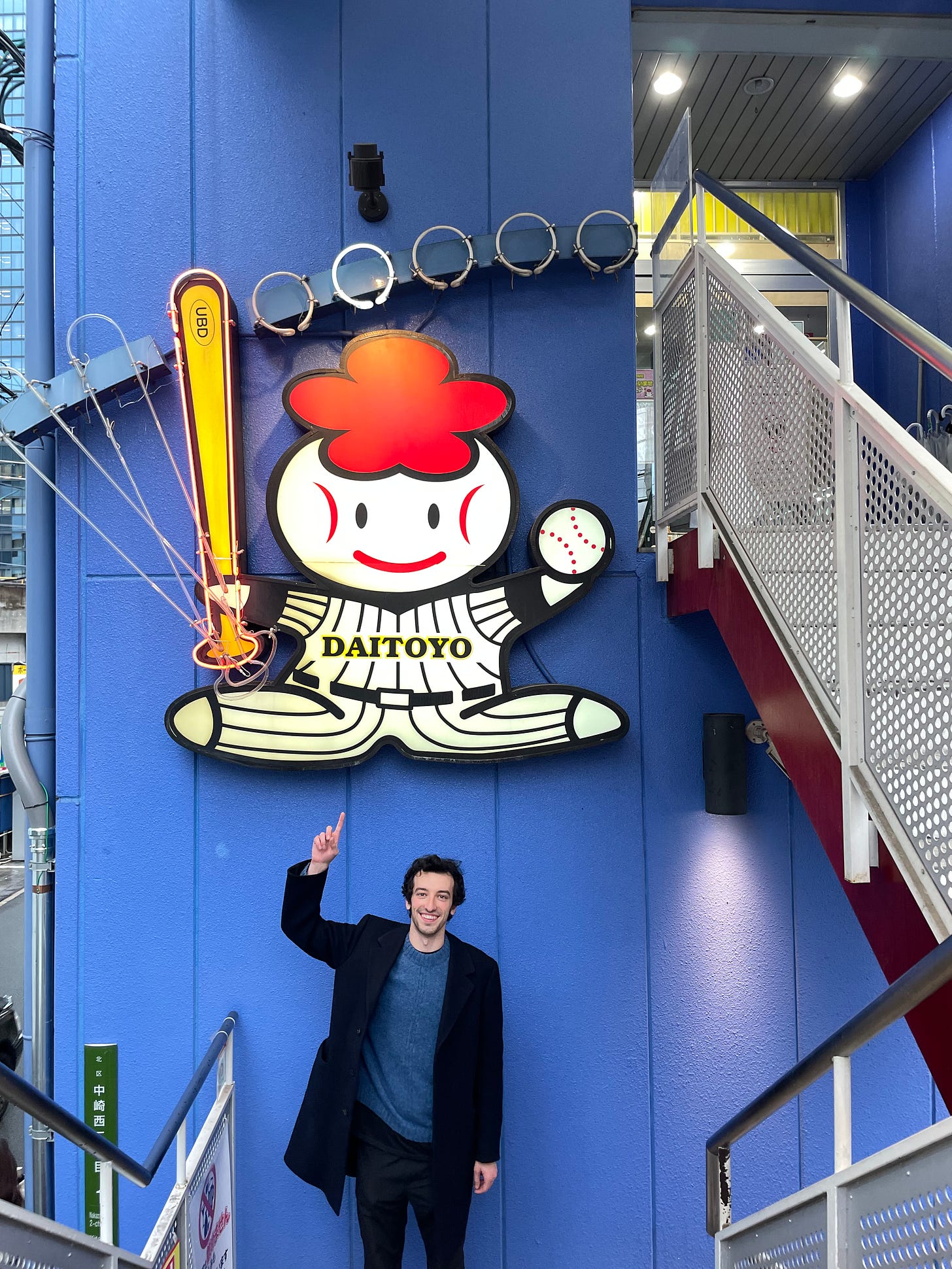Dear readers,
I’m coming to you from a bullet train between Tokyo and Osaka, where the trend report includes red wing boots, lots of upcycled jeans and an absolutely wild number of LA Dodgers hats. It appears that “Williamsburg c. 2011” really is back, at least halfway around the world.
On account of being out of the country, I did not catch most of the Oscars live, but I have caught up with highlights, so I feel prepared to deliver a blog on the big awards season/sports crossover we saw this year.
And some quick housekeeping: a few weeks ago, the gentlemen over at Nothing But Respect, a great basketball/culture podcast, discussed our last Southpaw edition and added some insights of their own. You can listen here. And this piece I wrote a couple of weeks ago for my day job at POLITICO Mag includes some comments from Max Read, of the excellent Read Max newsletter.
Now onto the main event — and the star of the awards season press junket.
-Calder

Timothée Chalamet barely won any awards for his portrayal of Bob Dylan in A Complete Unknown. But when he did make it on stage — at the Screen Actors’ Guild awards — he delivered the most memorable speech of the season. Here’s the section we’ll remember:
“I can’t downplay the significance of this award, because it means the most to me. And I know we’re in a subjective business, but the truth is, I’m really in pursuit of greatness. I know people don’t usually talk like that, but I want to be one of the greats. I’m inspired by the greats. I’m inspired by the greats here tonight. I’m as inspired by Daniel Day-Lewis, Marlon Brando, and Viola Davis as I am by Michael Jordan, Michael Phelps, and I want to be up there. So I’m deeply grateful. This doesn’t signify that, but it’s a little more fuel. It’s a little more ammo to keep going. Thank you so much.”
The 29-year-old’s naked display of ambition was unlike the typical thanking of agent, producers, cast, family and/or God. As a result, it made some people angry — in particular that a young actor felt confident enough to invoke the names of Hollywood giants and to cast art as a competition.
Mostly, though, it seemed to me that people generally liked the speech, and a lot of the online discourse that has since surrounded his awards season has been Chalamet fans defending the young actor from imagined critics. A lot of people were loudly proclaiming something like, “I don’t know what everyone is so mad about, he didn’t say anything wrong or even that controversial,” when in fact there was a vanishingly small number of people who actually were upset with the speech.
This is a strange phenomenon that feels unique to our modern version of social media and one that’s probably worth further exploration at some point down the road.1 But given that this is nominally a sports newsletter, let’s return to the text of Timmy’s speech, and specifically to Michael Jordan and Michael Phelps.
Chalamet is a well-known sports fan who won me over the first time I saw the photo of him, circa aged 13, throwing up deuces with Knicks legends Landry Fields and Andy Rautins at Grand Central Station after winning a contest for Knicks tickets. He’s also been spotted getting some shots up with Adam Sandler at various courts around downtown Manhattan.
So it’s not entirely a surprise that when Chalamet considers greatness, his mind reaches for icons of the sports world as well as actors. The cultures surrounding sports and art, though, are very different. Most artists bristle at the idea that any statistic, critic or even award could define their capability or career. Compare Chalamet’s comments to another viral awards season moment, Francis Ford Coppola’s Instagram post about being nominated for multiple Razzies (worst of the year):
“In this wreck of a world today, where ART is given scores as if it were professional wrestling, I chose to NOT follow the gutless rules laid down by an industry so terrified of risk that despite the enormous pool of young talent at its disposal, may not create pictures that will be relevant and alive 50 years from now … Let us remind ourselves us that box-office is only about money, and like war, stupidity and politics, has no true place in our future.”
The guy who made the weirdest movie I saw last year2 (and some of the best movies of the 20th century) is taking a conventional stance about the true value of art. Movies are NOT sports. Art is NOT entertainment in the same way that professional wrestling is.
And yet, Chalamet’s general approval rating seemed to go up after his SAG speech, even among serious artists. Anecdotally, my two artist parents — who both watch sports but who have never considered their work in that context — had no issue with the speech. Neither did any artist friend of mine, as far as I’m aware.
Why did the speech work?
It’s because Chalamet is aspiring not toward singular artistry but toward singular movie stardom. He has very little in common with the actors who he namechecked — in particular Day-Lewis and Brando, both grumpy, private men who would emerge from their holes to put dazzling performances on screen and then retreat. Can you imagine Daniel Day-Lewis on College Gameday?3
Rather, Chalamet is running a modern version of a Leo/Tobey/Jack playbook. He’s courtside. He’s the butt of the best jokes at the Oscars. He’s dating models. He’s positioned himself not at the mountaintop of artistry but at the center of Hollywood culture. He wants to be like Michael Jordan: known for greatness in his chosen field while also transcending that field to become a kind of omnipresent cultural icon.
That’s a much simpler sports comparison. But the names he mentioned in his speech aren’t an accident, either. You need to believe that you can be weird, recalcitrant, and art-obsessed to become a movie star. You have to think you’re Marlon Brando or Viola Davis in order to become Leonardo DiCaprio. Otherwise, you end up in the dreaded Ryan Reynolds/Chris Pratt zone. You become a winking, “relatable” actor who is aspiring towards nothing other than cultural relevance and the next check.
The measuring sticks are different in sports and in movies. There’s no Hollywood version of winning a championship ring. The Oscars are basically an even more flawed series of MVP awards. And yet, Timothée still really wants to win on terms that he continues to define. His love of sports and competition is not what makes him a good actor, but it does go hand in hand with his drive towards that amorphous idea of “greatness.” There’s real value in that; as he keeps pushing towards global superstardom, he’s making some interesting art and choices along the way.
Timmy reportedly can’t really hoop, but in a much deeper and more important sense, he knows ball.
An inversion of this idea — that when a public figure does something obviously odious, a mob of people jump on the chance to express their outrage — is the main subject of this great piece in the Famous & Beloved newsletter.
I saw Megalopolis at a 9:50 PM showing in Reno, Nevada while on a work trip; I was the only one in the theater.
I would really like to hear DDL say the words “Ball State”.





